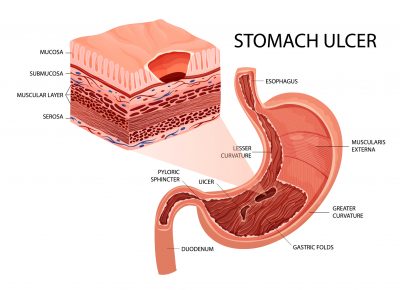You may have heard that Bruce Springsteen recently postponed his concert tour with the E-Street Band due to symptoms related to Peptic Ulcer Disease or PUD. PUD occurs when someone develops sores or ulcers in their stomach or upper small intestine. Stomach ulcers affect nearly four million Americans and, surprisingly, are not typically caused by eating spicy food or stress but could be caused by a bacterial infection, by genetics, from taking OTC pain meds or smoking.
Learn more about peptic ulcer disease or PUD symptoms and treatment.
What is Peptic Ulcer Disease?
A peptic ulcer is a sore in the lining of the stomach or the duodenum (upper part of the small intestine). The stomach secretes mucus to protect the lining of the stomach from the acids and digestive enzymes it produces to break down food for digestion. An imbalance of these digestive fluids causes inflammation and weakening of the protective mucus lining, which leads to the formation of ulcers.
Stomach ulcers can happen to anyone at any age, but they are more common in people after the age of 60-70.
What Causes Peptic Ulcers?
Peptic ulcers are caused by an imbalance between acid and pepsin enzyme in the stomach and duodenum. The imbalance of digestive fluids causes the protective mucus lining of the stomach and duodenum to become inflamed and weak, which leads to the formation of ulcers.
You are more likely to get peptic ulcers if you use nonsteroidal anti-inflammatory medications (NSAIDS) such as aspirin, ibuprofen, and naproxen for long periods of time.
Another common cause of peptic ulcers is Helicobacter pylori (H. pylori), a type of bacterial infection in the stomach. In the US, approximately 30 to 40 percent of people have an H. pylori infection, although most never develop a peptic ulcer.
In addition, tumors produced by a rare disorder known as Zollinger-Ellison syndrome can increase acid output and cause ulcers.
What are the Symptoms of Peptic Ulcers?
You might have peptic ulcers and not experience any symptoms. If symptoms do occur, they may include:
- A burning pain in your stomach or upper abdomen
- Nausea or vomiting
- Bloating
- Heartburn
Stomach or abdominal pain may occur more frequently between meals or at night. The pain may wake you at night. Your pain may get better or worse after eating a meal.
Ulcers can bleed in severe cases. Bleeding from an ulcer that goes unnoticed can cause life-threatening hemorrhage that requires immediate medical attention. Slowly bleeding ulcers might not produce any symptoms until anemia occurs. A rapidly bleeding ulcer can cause you to vomit blood or have blood in your stool.
How is PUD Diagnosed?
To get a peptic ulcer disease diagnosis your doctor will review your medical history and conduct a physical exam – this will include details about your symptoms and risk factors.
You may need blood tests, stool tests and a urea breath test to check for the presence of H. pylori bacteria. Other tests your doctor may order to confirm the diagnosis include:
- Upper gastrointestinal (GI) endoscopy
- Upper GI series with barium swallow
- CT scan
What is the Treatment for PUD?
Treatment will depend on the cause of your peptic ulcer. It is possible that your ulcers can resolve with lifestyle changes such as eliminating the use of NSAIDs. Your doctor may prescribe medication to treat your ulcer. If your ulcer is caused by an H. pylori infection, you will need an antibiotic. Other ulcers can be treated with:
- An over-the-counter H2 blocker (such as Zantac®, Tagamet®, or Pepcid AC®)
- A prescription proton pump inhibitor (PPI) (such as Prilosec®, Prevacid® or Nexium®)
- A tissue lining protector
H2 blockers and PPIs reduce stomach acid and protect the lining of your stomach and duodenum. The protectant coats ulcers and protects them against acid and enzymes to allow healing. Most ulcers heal with medication in about 8 weeks.
An upper GI endoscopy may be used to stop ulcers from bleeding while perforated ulcers or severe bleeding may require surgery.
Get a Consultation for Peptic Ulcers in Toms River, NJ
The digest health specialists at Ocean Family Gastroenterology are experts at diagnosing and treating digestive health issues including peptic ulcer disease. If you have concerns or questions about peptic ulcers or other digestive health and wellness, call us at 732-281-1590 or visit us online HERE.
